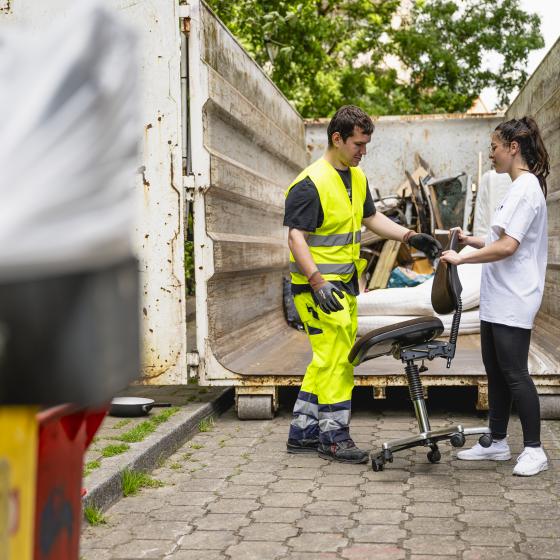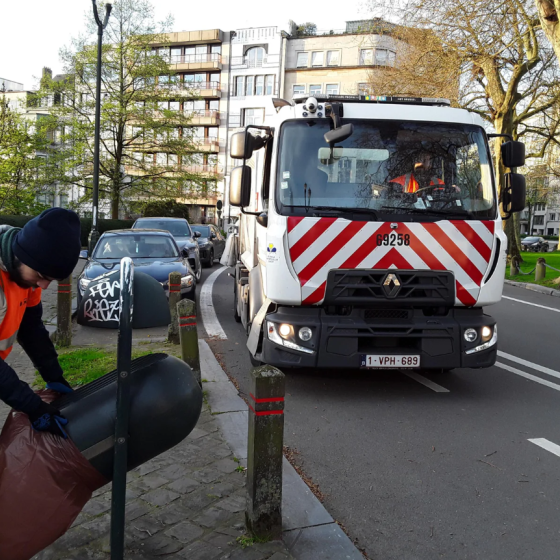Cooperation between the Region and Municipalities, a key measure of clean.brussels

On October 17, 2023, the second session of the Council for cooperation between Municipalities and the Region for urban cleanliness was held in the Jette Municipal Council chamber. This council brings together the Bruxelles-Propreté Agency, the 19 municipalities, and various public stakeholders involved in public cleanliness issues, including Brussels Environment, STIB, Brussels Mobility, and safe.brussels. Its purpose is to provide a framework for structured dialogue and cooperation among these stakeholders.
In his opening remarks, Minister Alain Maron, responsible for Environment and Public Cleanliness, emphasized the importance of a structured and constructive collaboration between the municipalities and the Region. This collaboration aims to find sustainable solutions to improve cleanliness in the Brussels-Capital Region, implement concrete actions on the ground, and enhance the living environment and the region's image.
Several points were presented and discussed during the October 17 session:
1. Initial evaluation of the household waste collection reform
Frédéric Fontaine, Director-General of Brussels-Cleanliness, provided an initial assessment of the household waste collection reform, which came into effect on May 15, 2023. He reminded that this reform aims to meet two European obligations: achieving a 60% recycling rate for household waste by 2030 and implementing food waste sorting. Less than six months after the reform, significant progress has been made. Volumes of food waste sorted in the orange bags have increased by 82%, the fraction of PMC+ has also increased, and residual waste in white bags has decreased by nearly 10%.
To address these changes, increased public awareness campaigns have been launched, covering three simultaneous changes: food waste sorting, reduced white bag collection frequency, and changes in collection days. The new trash collection schedules are increasingly being followed. Reminder actions and message reinforcement, including sanctions, are planned by the end of the year.
Other aspects of the reform directly affect urban cleanliness, such as reducing the time waste bags are left on the streets, eliminating Saturday collections, making adjustments based on municipal requests, and improving post-collection cleanliness. This reform has also brought the operational services of Brussels-Cleanliness and the municipalities closer, enhancing their collaboration.
In conclusion, Frédéric Fontaine affirmed that the reform is largely positive, acknowledging that there are areas for improvement, which are being studied for optimization, particularly regarding expanding the hours for evening collections.
2. Progress of Working Groups
The progress of two thematic working groups was presented at the Council. The first group is concerned with cleaning agreements between the Bruxelles-Propreté Agency and the municipalities (measure #2). Current agreements need to be revised, and the working group proposes a methodology based on four strategic objectives to improve collaboration on the ground between Brussels-Cleanliness and the municipalities, focusing on results rather than frequency or resources. The goal is to move to a more flexible, dynamic, coordinated, and transparent system.
The second thematic group is focusing on voluntary drop-off points (underground or surface containers) for the four main sorting fractions. A study on the performance of voluntary drop-off collection in cities comparable to the Brussels-Capital Region is underway (measure #33). Concurrently, the results of the 29 existing voluntary drop-off spaces in the Brussels-Capital Region are being analyzed, allowing for an assessment of the risks and opportunities for deployment in other types of neighborhoods or housing.
3. Action plans for Gare du Nord and Gare du Midi.
Specific action plans have been developed for these two specific areas. Both plans were presented to the members of the Council for Cooperation. Regarding Gare du Midi, a comprehensive plan with 84 actions has been decided upon and is being implemented. The "cleanliness" aspect of this plan involves Brussels-Cleanliness and the neighboring municipalities. The establishment of a "Public Zone Manager" for cleanliness (measure #3) allows for more effective coordination and on-the-ground actions.
In a different context, the Gare du Nord area is also the subject of a concerted action plan, addressing cleanliness issues among other interrelated factors.
The results of these two plans will be regularly shared in upcoming Council for Cooperation sessions.
Other important topics were also discussed during this Council, such as the issue of nitrous oxide canisters and the risk they pose to incinerator equipment when mixed with other waste.
The Council concluded with the announcement of the next Urban Cleanliness Forum, scheduled for the afternoon of December 19, 2023, at the BEL (Brussels Environment at Tour & Taxis). Invitations for this forum, which is a highly participative assembly of the urban cleanliness strategy, clean.brussels, will be sent to all relevant stakeholders soon.
In summary, after the second Council for Cooperation between the Region and municipalities, it is clear that public cleanliness issues in the Brussels-Capital Region, like in all major cities, are complex. However, the multi-stakeholder cooperation approach, embodied by the Council, is the best way to address them and find concerted solutions.
"Setting up a Municipalities-Region Cooperation Council for Urban Cleanliness, establishing a framework for dialogue and structural cooperation between actors" is measure 1 of objective 1 of the urban cleanliness strategy clean.brussels: Create lasting and effective channels for consultation and cooperation between the Region and the municipalities on the subject of urban cleanliness.




